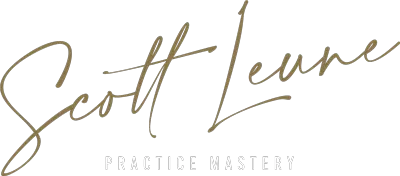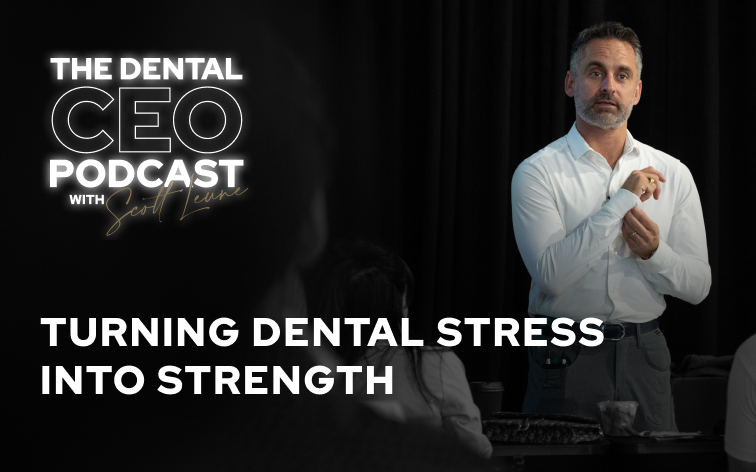Dr. Scott Leune on Turning Dental Stress Into Strength
Stress is a constant companion in the dental profession—whether it’s juggling clinical demands, managing team dynamics, or navigating patient expectations. In this episode of The Dental CEO Podcast, host Dr. Scott Leune sits down with stress physiologist Dr. Rebecca Heiss to explore how dentists can stop fighting stress and start using it as a tool for growth. From real-life examples to science-backed insights, this episode is a must-listen for any dentist looking to manage stress, avoid burnout, and lead with resilience.
About the Podcast & Episode
The Dental CEO Podcast delivers direct, unfiltered conversations for practice owners and entrepreneurial dentists. In Episode 21, Dr. Leune addresses a critical and often overlooked topic: stress in dentistry. The guest, Dr. Rebecca Heiss, specializes in the science of stress and performance. Together, they dissect how the body processes stress and how dentists can turn stress into a performance advantage rather than a liability. The conversation is packed with practical strategies to improve mindset, patient interactions, and team leadership during high-pressure moments.
About the Host and Guest
- Scott Leune is a practice owner and dental entrepreneur known for challenging conventional thinking in the dental space. He focuses on helping dentists become stronger leaders and business owners. Check out his webinars here.
- Rebecca Heiss holds a PhD in stress physiology and is an acclaimed keynote speaker. Her work focuses on how individuals can reframe and repurpose stress to improve performance in business and life. She’s the author of Instinct and the upcoming book Springboard.
Key Highlights – From Scott Leune’s Perspective
Stress Is a Signal That You Care
Scott Leune believes that stress isn’t inherently negative—it’s often a sign that something deeply matters to us. When dentists feel stressed, it’s usually because the work, outcomes, or people involved are meaningful. Recognizing this can shift your perspective and help reduce the emotional weight. Scott points out that stress in dentistry should be seen as an indicator of passion, not a personal failure.
Change the Story, Change the Outcome
Dr. Leune emphasizes the power of mindset in managing stress in dentistry. Instead of interpreting physical stress symptoms (like a racing heart) as danger, dentists can choose to see them as the body preparing for peak performance. Scott highlights that this simple mental shift—taught by Dr. Heiss—can improve focus, energy, and decision-making under pressure.
Use Stress to Fuel Action
Scott thinks that the best responses to stress are proactive. He reflects on moments when being “broken” by stress ultimately led to breakthrough growth. Instead of waiting to hit a breaking point, he urges dentists to lean in early. Reframing stress as a push toward needed change—whether in systems, roles, or behaviors—can help avoid long-term burnout dental professionals often face.
Stop Trying to “Calm Down”
Scott Leune believes the common advice to “calm down” under stress is counterproductive. Stress is physiological—you can’t just will it away. Instead, dentists should work with it. That means acting with confidence, maintaining body posture, and projecting calm energy even when under pressure. This helps not only the dentist but also creates emotional stability for the entire team and patient experience.
Leadership Starts With Emotional Contagion
Dr. Leune emphasizes that dentists set the emotional tone of the practice. If the doctor reacts with panic, the team will mirror it. If the doctor approaches stress with composure and purpose, that energy becomes contagious. Scott encourages dentists to be intentional in how they show up during stressful moments, turning chaos into cohesion.
Curiosity Over Conflict
Scott shares a powerful reframe for handling difficult patient situations: lead with curiosity, not defensiveness. Instead of seeing an upset patient as a threat, see them as a mystery to solve. Ask questions, validate emotions, and stay curious. This not only diffuses tension but also creates space for learning and growth. It’s a strategy that supports both conflict resolution and mental health support for dentists.
Service Is the Best Stress Reliever
Scott believes that traditional self-care isn’t enough. According to Dr. Heiss’s research, the most effective way to lower stress is by serving others. Whether it’s helping a teammate or supporting a patient, choosing service transforms stress into something productive and meaningful. For dentists facing emotional fatigue or burnout, this small shift can restore energy and connection.
Know When to Let Go
Dr. Leune acknowledges that not all stress is useful. If a situation or person in your practice consistently drains you without purpose or progress, it may be time to walk away. Stress can also be a boundary-setting tool. Scott reinforces that it’s okay to say no, to let go of unproductive roles or relationships, and to prioritize personal well-being.
Recalibrate, Reframe, Realign
Scott reflects on a practical framework shared in the episode.
- Recalibrate: Recognize you’re under stress and prepare to take control.
- Reframe: Change the meaning of the stress—from threat to opportunity.
- Realign: Act intentionally based on your new mindset.
He says this sequence can help dentists channel stress in real time, keeping them focused, resilient, and in control.
Rise Through Stress, Don’t Get Crushed By It
Scott concludes that stress management for dentists isn’t about eliminating stress—it’s about rising through it. Dentists will always face challenges, but they can decide whether those challenges make them bitter or better. The key is to train your brain to use stress as a call to action rather than a weight to endure.
Read more articles here: https://scottleune.com/blog/
Conclusion
Dentistry will never be stress-free, but it doesn’t have to be destructive. By understanding the science behind stress and reframing how you respond to it, you can turn daily pressure into progress. Whether it’s managing a chaotic schedule, resolving patient conflict, or facing your own self-doubt, managing stress in dentistry starts with mindset. This episode offers a roadmap to lead with clarity, serve with strength, and grow from every challenge. As Dr. Leune says: stress isn’t the problem—what you do with it is.

